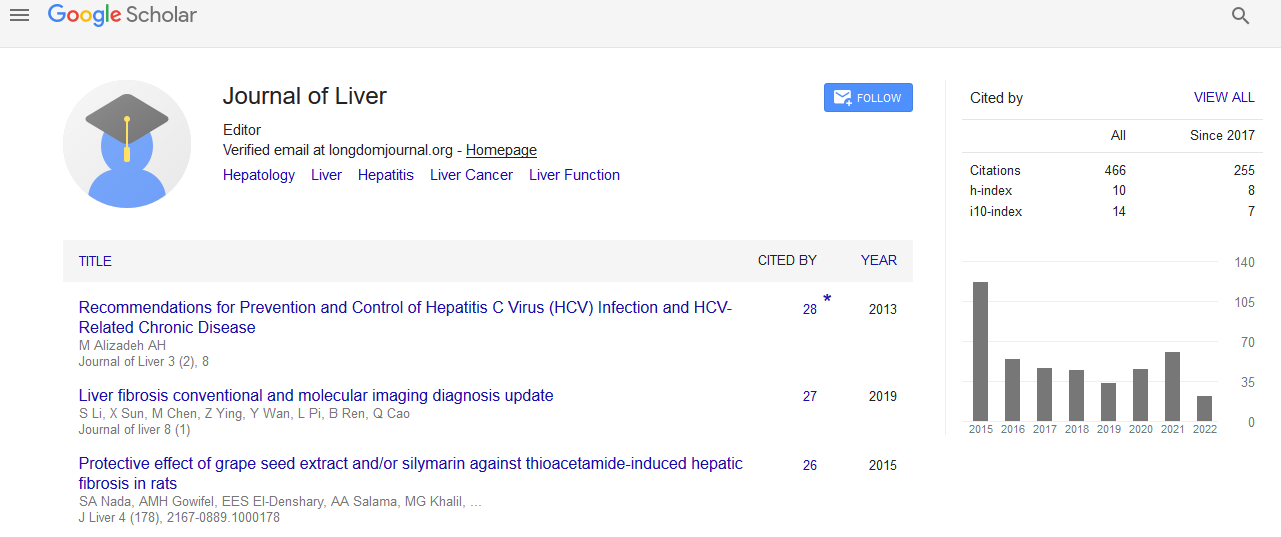PMC/PubMed Indexed Articles
Indexed In
- Open J Gate
- Genamics JournalSeek
- Academic Keys
- RefSeek
- Hamdard University
- EBSCO A-Z
- OCLC- WorldCat
- Publons
- Geneva Foundation for Medical Education and Research
- Google Scholar
Useful Links
Share This Page
Journal Flyer

Open Access Journals
- Agri and Aquaculture
- Biochemistry
- Bioinformatics & Systems Biology
- Business & Management
- Chemistry
- Clinical Sciences
- Engineering
- Food & Nutrition
- General Science
- Genetics & Molecular Biology
- Immunology & Microbiology
- Medical Sciences
- Neuroscience & Psychology
- Nursing & Health Care
- Pharmaceutical Sciences
Establishment of Anti-hepatocellular Carcinoma drug screening platform in zebrafish
World Congress on Hepatitis
July 20-22, 2015 Orlando, Florida, USA
Chiou-Hwa Yuh
Posters-Accepted Abstracts: J Liver
Abstract:
The formation of hepatocellular carcinoma (HCC) is a chronic progress including hepatitis, steatosis, fibrosis, cirrhosis. Liver cancer is the third most common cancer worldwide and ranked as a leading cause of mortality in Taiwan. Traditional chemotherapy and radiation has poor effectiveness for the treatment of liver cancer patients, for the target therapy, Sorafenib is the only one approved by FDA which can inhibit liver cancer and prolong life. The development of new target therapy is therefore urgently needed. Previously, we have used the HBx-induced HCC mouse model and identified four common regulators (Src, Edn1, Bmp4 and Bmp7) which can be used as molecular targets for HCC treatment. Furthermore, we have established the transgenic fish overexpressing HBx or src in the p53 mutant, and edn1 transgenic zebrafish developed into HCC. Those transgenic fish developed steatosis, hepatitis, fibrosis before cancer formation. The HCC from those transgenic zebrafish is much more similar to human HCC in histopathology or the pattern of gene expression, which allow them more suitable as drug screening platform to identify the drugs to effectively treat human liver cancer. In this report, I will demonstrate the advantage of zebrafish HCC model as well as zebrafish embryos. We have developed a high-throughput drug screening platform to identify novel and safe anti-HCC therapeutic means to save more life. In addition, due to the heterogeneity of HCC, there are no effective clinical tests that can predict the effectiveness of the anti-cancer agents for patients. Using patientderived xenograft zebrafish model, we are able to identify personalized medicine for the future use in clinical therapy.
Biography :
Chiou-Hwa Yuh has completed her PhD from National Yang-Ming University in Taiwan, and Postdoctoral studies from California Institute of Technology in USA. She was famous in Developmental Gene Regulatory Networks. She initiated the systematic analysis of hepatocellular carcinoma (HCC) in mouse model, and established transgenic zebrafish model. She further developed the drug screening platform to identified novel small molecules which are effective in treatment HCC and lower toxicity compared to Sorafenib. She has published 41 papers in reputed journals and has been serving as an editorial board member of repute journals.

